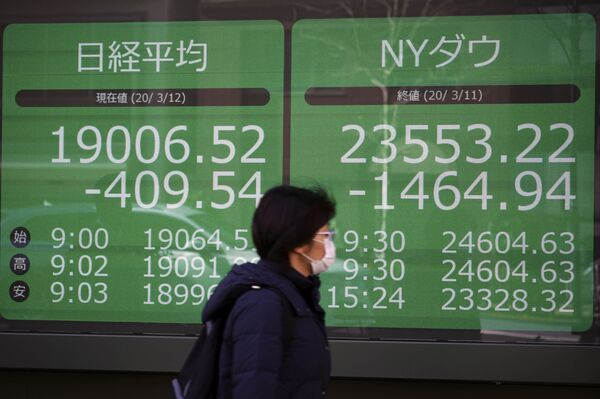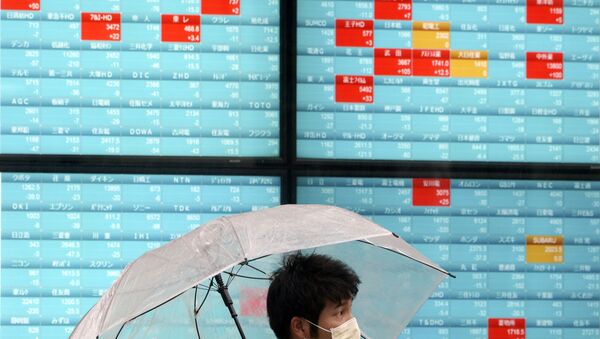The trend is caused by the growing poverty in the country which followed the 1997–98 Asian financial crisis, according to Nagai, who is blaming the country's "life-time employment system" for hampering the development of the middle class. Speaking to CNBC, the economist said that a "more dynamic human resource allocation" could help Japan find a way out.
Two Stumbling Blocks in the Road to Development
"I agree and disagree. I agree with the great line that the middle class is decreasing and the (blue collar) class is increasing. I disagree that [Nagai] didn’t mention why the (blue collar) class increased", says Katsuyuki Kamei, an expert on risk management and professor at Kansai University, commenting on the economist's findings.
According to Kamei, one of the reasons behind the rising poverty is the problem of so-called "dispatched", or temporary, labour in Japan.
"We can guess from his argument that the lost generation, around 23 (the age when most Japanese finish their study at university) in 1990, after the burst of the bubble economy (in 1987) or in 1997 after the Asian economic crisis, had great difficulty in finding a job which promised lifelong employment, which could not be what we imagine as the middle class. Many of them were obliged to start working as dispatch labor, what we call 'haken' in Japanese", the academic explains.
The country's 1985 Worker Dispatch Law was aimed at allowing industries hit by shortages to hire highly skilled workers. By 2008, the number of temporary workers had reached 30% of the Japanese labour force. The trend continued to gain pace in the subsequent years due to the global financial crisis and long economic recession of 2007–2010.
Though "the lost generation" is now around 45 - 50 years old many of them still remain dispatch workers and cannot join the middle class, Kamei notes. "Dispatch work is leading to poverty", he stresses.
Yet another problem stalling middle-class growth is the “lifetime employment system”, according to the professor. Under this system, Japanese companies hire their employers directly from high school or university expecting them to stay with the firm for decades to come. However, as the Japanese government tries to let the old work as long as possible, they are leaving the young out in the cold, the academic says.
"Those who are over 50 or 60 taking the work from the young often are not as productive as the young which is very unjust", Kamei underscores. "The high class takes the chance from the young, who should have been the middle class".
To fix this problem the government should give more chances to the younger generation, argues the professor: "Stop prolonging the age of retirement. Improve the birth rate. Help young couples. Help single mothers or single fathers. The old should retire and spend money for the country’s economy", he stresses.

'Middle Class Will Not Die Out in Japan'
The erosion of the middle class faced by Japan is largely reflecting the global trend that struck the world's developed economies, according to Professor Seijiro Takeshita, the dean of the School of Management and Information at the University of Shizuoka.
Thus, in 2019 the Organisation for Economic Co-operation and Development (OECD) acknowledged in its report eloquently titled "Under Pressure: The Squeezed Middle Class" that that the middle class "has shrunk in most OECD countries" as it has become more difficult for younger generations to make it to this social strata.
Still, according to the professor, Japan has a competitive advantage which should prevent its middle class from "dying out".
"Disparity is rising in Japan – and such an argument has been on display for quite a while", admits Takeshita, adding, however, that Japan's problem of divide of wealth and classes is "nothing in comparison to that of other countries".
"In fact, we are the only country without a strong line between the white and blue collar due to the life-time employment system that is closely tagged with the seniority system", he explains. "There is also little, if any, segregation between the executives and the workers".
According to Takeshita, Japan's corporate culture is the glue that keeps the middle class together.
To illustrate his point, the academic draws attention to the fact that the ratio of pay difference between a CEO and an average worker is around eight times, while it is well over 80-120 times in the US.
"The strong characteristic of the Japanese governance is that layoff is the last resort", the academic stresses. "The first thing that goes [under cuts] are the CEO (and other executives’) bonuses. This is in sharp contrast to the American governance, where the CEO slashes the workforce (thus cutting cost) and getting a hefty bonus".
He underscores that cooperation, mutual understanding, sharing, or, in other words, harmonization of social groups and organizations is always thought to be one of the most important features in Japanese society.
"Hence, there is no way that the middle class in Japan will disintegrate", Takeshita underscores.




